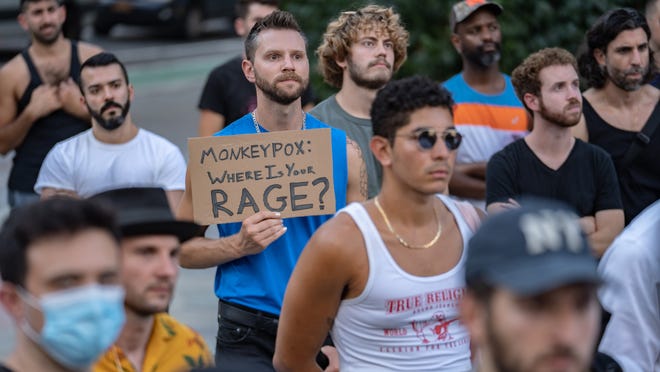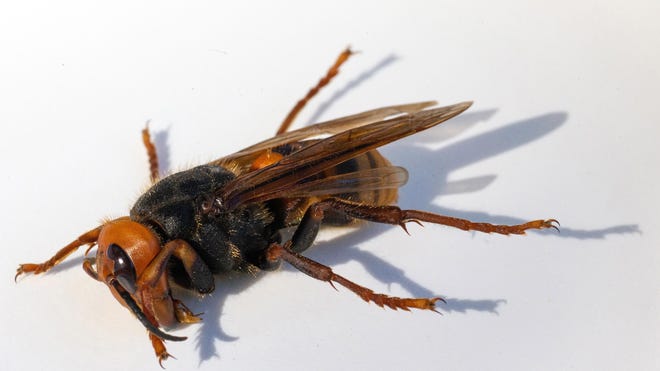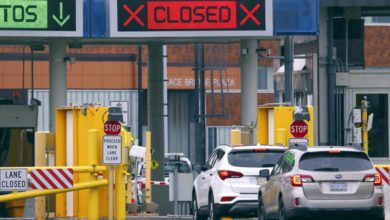
As the monkeypox outbreak continues to spread worldwide, cases across the U.S. are rising – with President Joe Biden declaring a public health emergency Thursday.
Confirmed cases of monkeypox have now surpassed 28,220 worldwide, according to Saturday numbers from the Centers for Disease Control and Prevention. The outbreak, first spotted in Europe in late April, has reached 88 countries – the vast majority in nations that hadn't previously had significant caseloads of the rare, viral infection.
The World Health Organization said monkeypox was a global health emergency late last month.
The U.S. had reported more than 7,500 confirmed cases as of Saturday, per the CDC. Highly-populated states are leading the numbers – with 1,862 confirmed cases in New York, followed by 826 confirmed cases in California. Numbers including probable cases are higher.
What is monkeypox? A look at symptoms, treatment and addressing the myths
Combatting misinformation and stigma:Monkeypox is spreading through sex, but it's not an STI. Why calling it one is a problem.
States declaring emergency over monkeypox
On Monday, before the Biden Administration's Thursday announcement, California Gov. Gavin Newsom announced a state of emergency, and Illinois Gov. J.B. Pritzker declared the outbreak a public health emergency. Declaring an emergency expands resources such as vaccine distribution.
"We’ll continue to work with the federal government to secure more vaccines, raise awareness about reducing risk, and stand with the LGBTQ community fighting stigmatization," Newsom said in a statement Monday.
Friday, Gov. Kathy Hochul also declared New York's outbreak as a state disaster emergency.
Friday:New York declares state disaster emergency for monkeypox outbreak
Biden administration declares public health emergency
Following declarations from some states, the Biden administration announced a nationwide public health emergency on Thursday. The move could make it easier to access federal resources to combat both monkeypox's spread and the stigma against the community of men who have sex with men, who have been predominately impacted by the outbreak, officials say.
Many have criticized the Biden administration for not responding quicker to the monkeypox outbreak, repeating some of the same mistakes that plagued the nation during the early days of COVID-19. But federal officials say that Thursday's move is intended to get ahead of the spread of the once-rare disease.
Repeating history:After repeating early COVID mistakes, US now has the world’s biggest monkeypox outbreak
Thursday:Biden administration declares monkeypox a public health emergency
"We continue to marshal forward the tools we need to make sure we can take on monkeypox and keep it from spreading to the point of becoming endemic," Health and Human Services Secretary Xavier Becerra said.
In recent weeks, clinics across the country have said they haven’t received enough of the two-shot vaccine to meet demand. On Monday, White House press secretary Karine Jean-Pierre said that 1.1 million doses had been made available nationwide and that testing capacity was boosted to more than 80,000 each week.
Monkeypox does not usually cause serious illness – however, it can result in hospitalization or death. The virus is spread through close, physical contact. The current outbreak is impacting some populations more than others, notably men who have sex with men, but health officials stress that the virus can infect anyone.
Monkeypox is not a gay disease. But LGBTQ leaders say they need more help for gay men and everyone else
Monkeypox cases by state
Here's where confirmed cases stand across U.S. states and territories, according to CDC numbers from Thursday, August 4.
Alabama: 19
Alaska: 2
Arizona: 102
Arkansas: 9
California: 826
Colorado: 78
Connecticut: 43
Delaware: 6
District of Columbia: 283
Florida: 633
Georgia: 596
Hawaii: 11
Idaho: 7
Illinois: 602
Indiana: 63
Iowa: 12
Kansas: 1
Kentucky: 9
Louisiana: 74
Maine: 2
Maryland: 182
Massachusetts: 157
Michigan: 70
Minnesota: 46
Mississippi: 6
Missouri: 14
Montana: No confirmed cases reported by the CDC yet.
Nebraska: 12
Nevada: 29
New Hampshire: 15
New Jersey: 188
New Mexico: 10
New York: 1,862
North Carolina: 95
North Dakota: 1
Ohio: 45
Oklahoma: 11
Oregon: 70
Pennsylvania: 105
Puerto Rico: 19
Rhode Island: 29
South Carolina: 30
South Dakota: 1
Tennessee: 42
Texas: 606
Utah: 46
Vermont: 1
Virginia: 122
Washington: 175
West Virginia: 3
Wisconsin: 22
Wyoming: No confirmed cases reported by the CDC yet.
What's everyone talking about? Sign up for our trending newsletter to get the latest news of the day
Contributing: Karen Weintraub, Maureen Groppe, Michael Collins, USA TODAY. The Associated Press.
Source link










